Comprehensive Analysis of Nestle's Business, Leadership, and Culture
VerifiedAdded on 2021/02/20
|10
|2804
|48
Report
AI Summary
This report provides a comprehensive analysis of Nestle, a Swiss multinational food and beverage company. It begins with a brief history and summary of the business, highlighting its global presence and diverse product portfolio. The report then delves into Nestle's vision, leadership style, management practices, and organizational culture, utilizing relevant theories to explain these aspects. It examines the company's democratic leadership style and its impact on employee engagement and decision-making. The report further evaluates how Nestle's culture and management style influence its functions and strategies, emphasizing the importance of adapting to international markets and consumer preferences. Finally, the report offers recommendations for improving Nestle's leadership style, management practices, and overall strategies, suggesting the adoption of various management theories and cultural approaches to enhance organizational effectiveness and achieve its goals. The report concludes by emphasizing the role of leadership and culture in driving the company's success and maintaining its position in the global market.
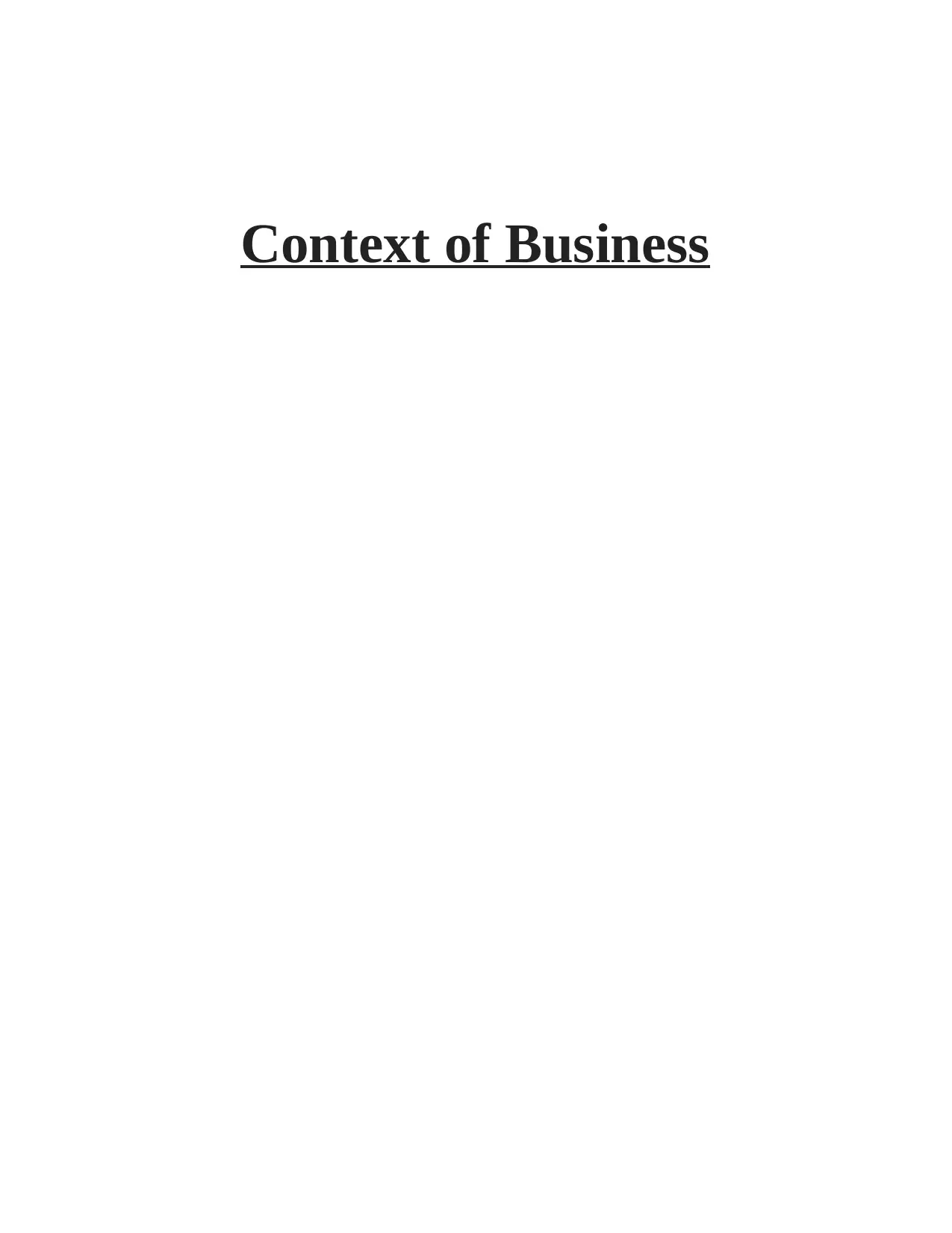
Context of Business
Paraphrase This Document
Need a fresh take? Get an instant paraphrase of this document with our AI Paraphraser
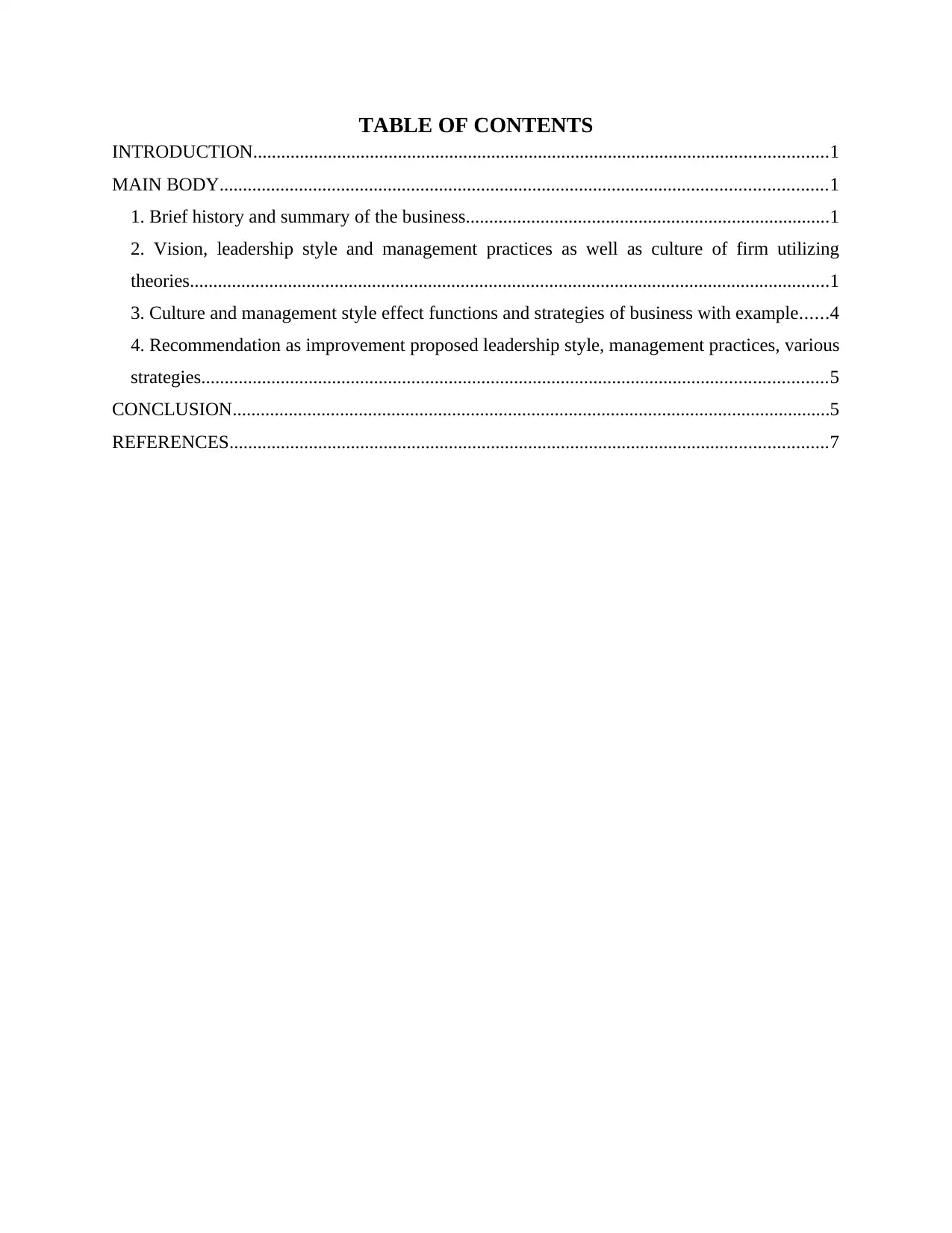
TABLE OF CONTENTS
INTRODUCTION...........................................................................................................................1
MAIN BODY..................................................................................................................................1
1. Brief history and summary of the business..............................................................................1
2. Vision, leadership style and management practices as well as culture of firm utilizing
theories.........................................................................................................................................1
3. Culture and management style effect functions and strategies of business with example......4
4. Recommendation as improvement proposed leadership style, management practices, various
strategies......................................................................................................................................5
CONCLUSION................................................................................................................................5
REFERENCES................................................................................................................................7
INTRODUCTION...........................................................................................................................1
MAIN BODY..................................................................................................................................1
1. Brief history and summary of the business..............................................................................1
2. Vision, leadership style and management practices as well as culture of firm utilizing
theories.........................................................................................................................................1
3. Culture and management style effect functions and strategies of business with example......4
4. Recommendation as improvement proposed leadership style, management practices, various
strategies......................................................................................................................................5
CONCLUSION................................................................................................................................5
REFERENCES................................................................................................................................7
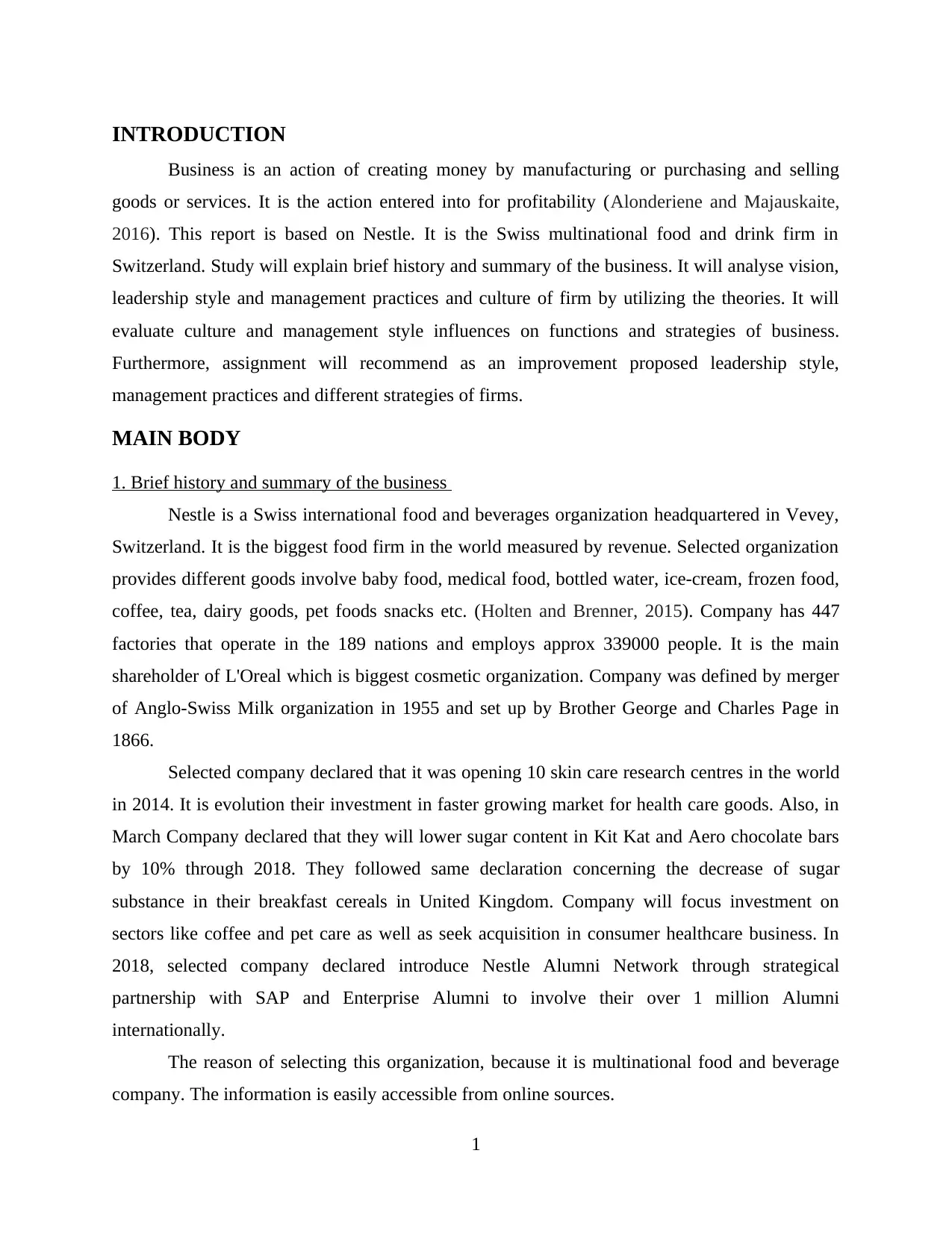
INTRODUCTION
Business is an action of creating money by manufacturing or purchasing and selling
goods or services. It is the action entered into for profitability (Alonderiene and Majauskaite,
2016). This report is based on Nestle. It is the Swiss multinational food and drink firm in
Switzerland. Study will explain brief history and summary of the business. It will analyse vision,
leadership style and management practices and culture of firm by utilizing the theories. It will
evaluate culture and management style influences on functions and strategies of business.
Furthermore, assignment will recommend as an improvement proposed leadership style,
management practices and different strategies of firms.
MAIN BODY
1. Brief history and summary of the business
Nestle is a Swiss international food and beverages organization headquartered in Vevey,
Switzerland. It is the biggest food firm in the world measured by revenue. Selected organization
provides different goods involve baby food, medical food, bottled water, ice-cream, frozen food,
coffee, tea, dairy goods, pet foods snacks etc. (Holten and Brenner, 2015). Company has 447
factories that operate in the 189 nations and employs approx 339000 people. It is the main
shareholder of L'Oreal which is biggest cosmetic organization. Company was defined by merger
of Anglo-Swiss Milk organization in 1955 and set up by Brother George and Charles Page in
1866.
Selected company declared that it was opening 10 skin care research centres in the world
in 2014. It is evolution their investment in faster growing market for health care goods. Also, in
March Company declared that they will lower sugar content in Kit Kat and Aero chocolate bars
by 10% through 2018. They followed same declaration concerning the decrease of sugar
substance in their breakfast cereals in United Kingdom. Company will focus investment on
sectors like coffee and pet care as well as seek acquisition in consumer healthcare business. In
2018, selected company declared introduce Nestle Alumni Network through strategical
partnership with SAP and Enterprise Alumni to involve their over 1 million Alumni
internationally.
The reason of selecting this organization, because it is multinational food and beverage
company. The information is easily accessible from online sources.
1
Business is an action of creating money by manufacturing or purchasing and selling
goods or services. It is the action entered into for profitability (Alonderiene and Majauskaite,
2016). This report is based on Nestle. It is the Swiss multinational food and drink firm in
Switzerland. Study will explain brief history and summary of the business. It will analyse vision,
leadership style and management practices and culture of firm by utilizing the theories. It will
evaluate culture and management style influences on functions and strategies of business.
Furthermore, assignment will recommend as an improvement proposed leadership style,
management practices and different strategies of firms.
MAIN BODY
1. Brief history and summary of the business
Nestle is a Swiss international food and beverages organization headquartered in Vevey,
Switzerland. It is the biggest food firm in the world measured by revenue. Selected organization
provides different goods involve baby food, medical food, bottled water, ice-cream, frozen food,
coffee, tea, dairy goods, pet foods snacks etc. (Holten and Brenner, 2015). Company has 447
factories that operate in the 189 nations and employs approx 339000 people. It is the main
shareholder of L'Oreal which is biggest cosmetic organization. Company was defined by merger
of Anglo-Swiss Milk organization in 1955 and set up by Brother George and Charles Page in
1866.
Selected company declared that it was opening 10 skin care research centres in the world
in 2014. It is evolution their investment in faster growing market for health care goods. Also, in
March Company declared that they will lower sugar content in Kit Kat and Aero chocolate bars
by 10% through 2018. They followed same declaration concerning the decrease of sugar
substance in their breakfast cereals in United Kingdom. Company will focus investment on
sectors like coffee and pet care as well as seek acquisition in consumer healthcare business. In
2018, selected company declared introduce Nestle Alumni Network through strategical
partnership with SAP and Enterprise Alumni to involve their over 1 million Alumni
internationally.
The reason of selecting this organization, because it is multinational food and beverage
company. The information is easily accessible from online sources.
1
⊘ This is a preview!⊘
Do you want full access?
Subscribe today to unlock all pages.

Trusted by 1+ million students worldwide
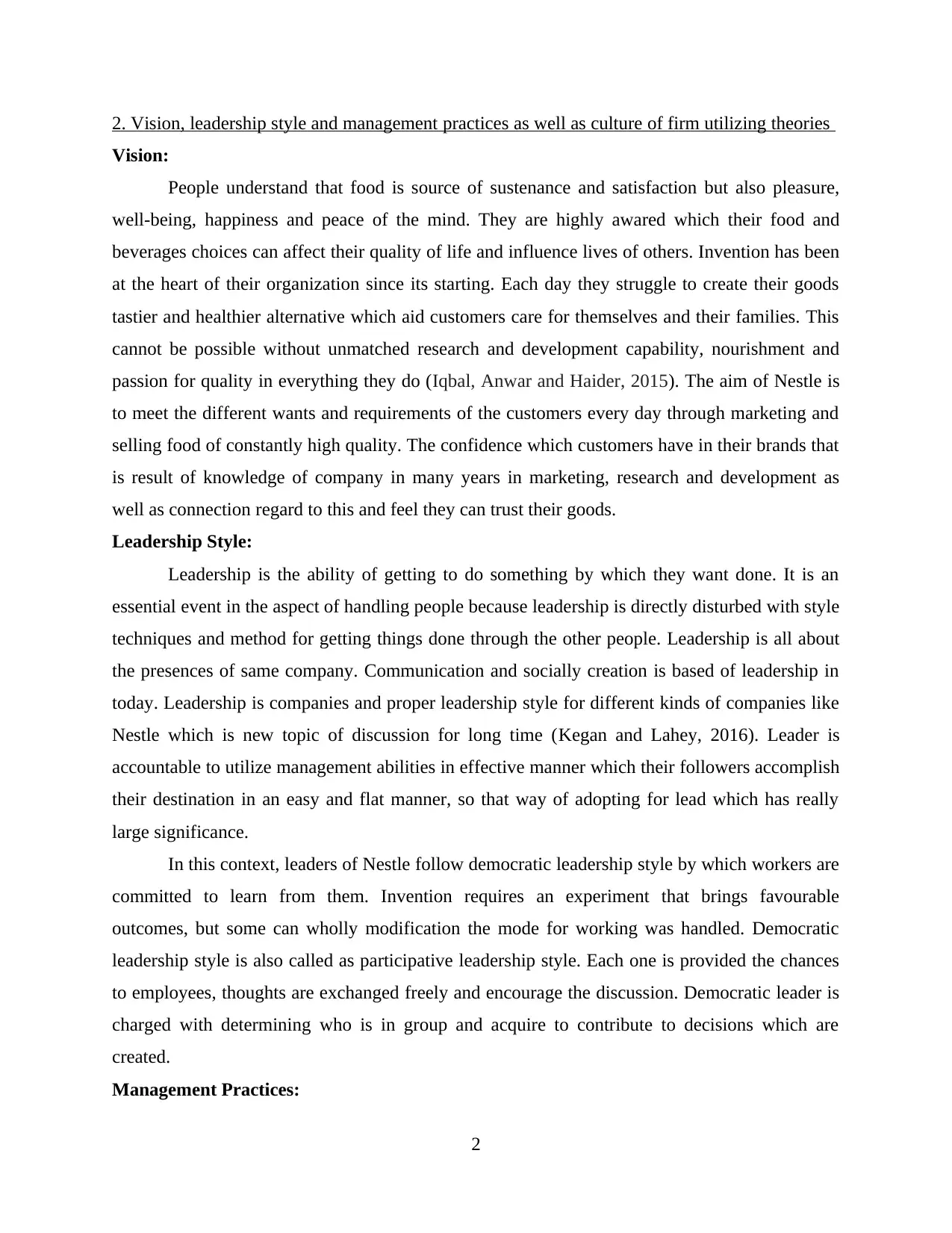
2. Vision, leadership style and management practices as well as culture of firm utilizing theories
Vision:
People understand that food is source of sustenance and satisfaction but also pleasure,
well-being, happiness and peace of the mind. They are highly awared which their food and
beverages choices can affect their quality of life and influence lives of others. Invention has been
at the heart of their organization since its starting. Each day they struggle to create their goods
tastier and healthier alternative which aid customers care for themselves and their families. This
cannot be possible without unmatched research and development capability, nourishment and
passion for quality in everything they do (Iqbal, Anwar and Haider, 2015). The aim of Nestle is
to meet the different wants and requirements of the customers every day through marketing and
selling food of constantly high quality. The confidence which customers have in their brands that
is result of knowledge of company in many years in marketing, research and development as
well as connection regard to this and feel they can trust their goods.
Leadership Style:
Leadership is the ability of getting to do something by which they want done. It is an
essential event in the aspect of handling people because leadership is directly disturbed with style
techniques and method for getting things done through the other people. Leadership is all about
the presences of same company. Communication and socially creation is based of leadership in
today. Leadership is companies and proper leadership style for different kinds of companies like
Nestle which is new topic of discussion for long time (Kegan and Lahey, 2016). Leader is
accountable to utilize management abilities in effective manner which their followers accomplish
their destination in an easy and flat manner, so that way of adopting for lead which has really
large significance.
In this context, leaders of Nestle follow democratic leadership style by which workers are
committed to learn from them. Invention requires an experiment that brings favourable
outcomes, but some can wholly modification the mode for working was handled. Democratic
leadership style is also called as participative leadership style. Each one is provided the chances
to employees, thoughts are exchanged freely and encourage the discussion. Democratic leader is
charged with determining who is in group and acquire to contribute to decisions which are
created.
Management Practices:
2
Vision:
People understand that food is source of sustenance and satisfaction but also pleasure,
well-being, happiness and peace of the mind. They are highly awared which their food and
beverages choices can affect their quality of life and influence lives of others. Invention has been
at the heart of their organization since its starting. Each day they struggle to create their goods
tastier and healthier alternative which aid customers care for themselves and their families. This
cannot be possible without unmatched research and development capability, nourishment and
passion for quality in everything they do (Iqbal, Anwar and Haider, 2015). The aim of Nestle is
to meet the different wants and requirements of the customers every day through marketing and
selling food of constantly high quality. The confidence which customers have in their brands that
is result of knowledge of company in many years in marketing, research and development as
well as connection regard to this and feel they can trust their goods.
Leadership Style:
Leadership is the ability of getting to do something by which they want done. It is an
essential event in the aspect of handling people because leadership is directly disturbed with style
techniques and method for getting things done through the other people. Leadership is all about
the presences of same company. Communication and socially creation is based of leadership in
today. Leadership is companies and proper leadership style for different kinds of companies like
Nestle which is new topic of discussion for long time (Kegan and Lahey, 2016). Leader is
accountable to utilize management abilities in effective manner which their followers accomplish
their destination in an easy and flat manner, so that way of adopting for lead which has really
large significance.
In this context, leaders of Nestle follow democratic leadership style by which workers are
committed to learn from them. Invention requires an experiment that brings favourable
outcomes, but some can wholly modification the mode for working was handled. Democratic
leadership style is also called as participative leadership style. Each one is provided the chances
to employees, thoughts are exchanged freely and encourage the discussion. Democratic leader is
charged with determining who is in group and acquire to contribute to decisions which are
created.
Management Practices:
2
Paraphrase This Document
Need a fresh take? Get an instant paraphrase of this document with our AI Paraphraser
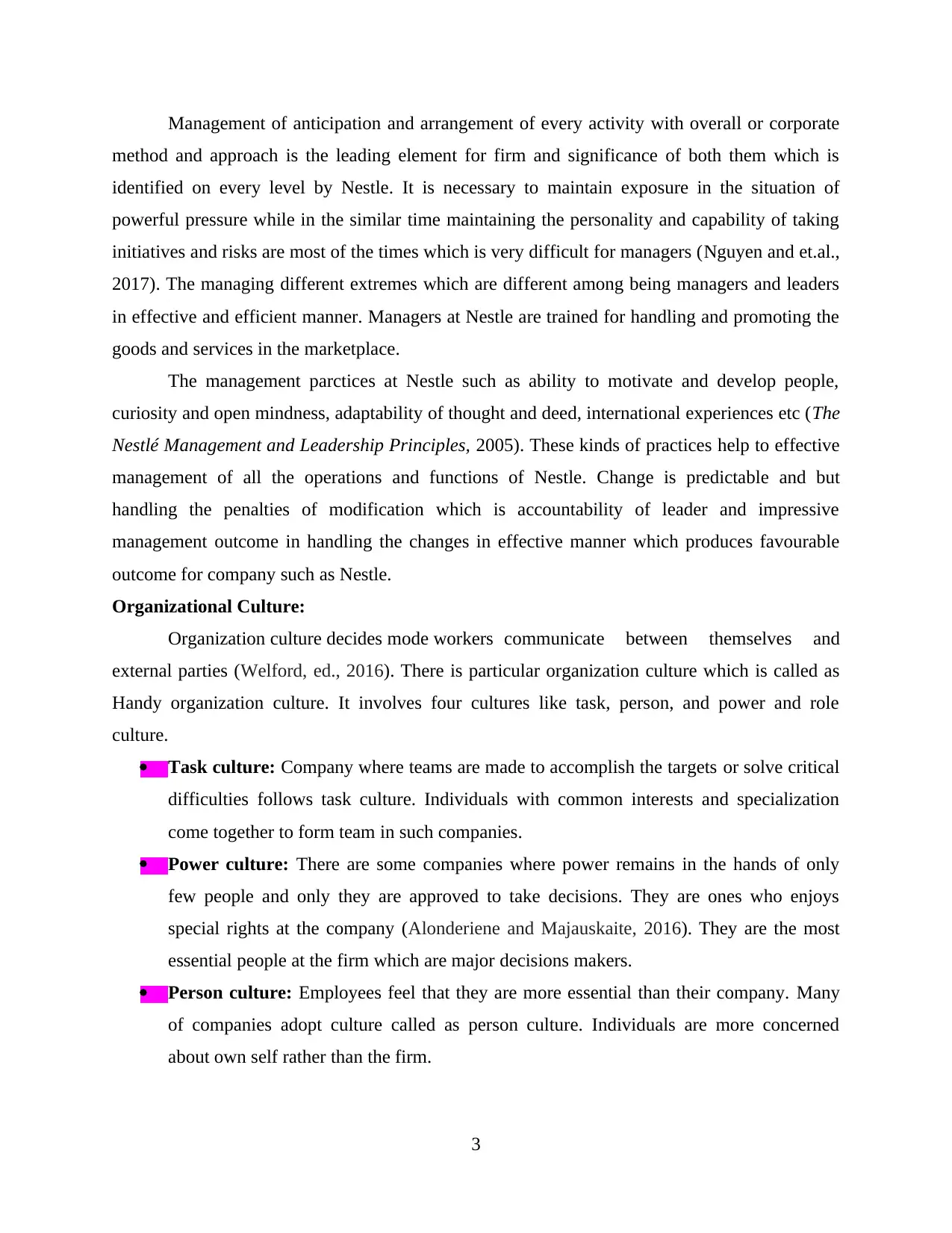
Management of anticipation and arrangement of every activity with overall or corporate
method and approach is the leading element for firm and significance of both them which is
identified on every level by Nestle. It is necessary to maintain exposure in the situation of
powerful pressure while in the similar time maintaining the personality and capability of taking
initiatives and risks are most of the times which is very difficult for managers (Nguyen and et.al.,
2017). The managing different extremes which are different among being managers and leaders
in effective and efficient manner. Managers at Nestle are trained for handling and promoting the
goods and services in the marketplace.
The management parctices at Nestle such as ability to motivate and develop people,
curiosity and open mindness, adaptability of thought and deed, international experiences etc (The
Nestlé Management and Leadership Principles, 2005). These kinds of practices help to effective
management of all the operations and functions of Nestle. Change is predictable and but
handling the penalties of modification which is accountability of leader and impressive
management outcome in handling the changes in effective manner which produces favourable
outcome for company such as Nestle.
Organizational Culture:
Organization culture decides mode workers communicate between themselves and
external parties (Welford, ed., 2016). There is particular organization culture which is called as
Handy organization culture. It involves four cultures like task, person, and power and role
culture.
Task culture: Company where teams are made to accomplish the targets or solve critical
difficulties follows task culture. Individuals with common interests and specialization
come together to form team in such companies.
Power culture: There are some companies where power remains in the hands of only
few people and only they are approved to take decisions. They are ones who enjoys
special rights at the company (Alonderiene and Majauskaite, 2016). They are the most
essential people at the firm which are major decisions makers.
Person culture: Employees feel that they are more essential than their company. Many
of companies adopt culture called as person culture. Individuals are more concerned
about own self rather than the firm.
3
method and approach is the leading element for firm and significance of both them which is
identified on every level by Nestle. It is necessary to maintain exposure in the situation of
powerful pressure while in the similar time maintaining the personality and capability of taking
initiatives and risks are most of the times which is very difficult for managers (Nguyen and et.al.,
2017). The managing different extremes which are different among being managers and leaders
in effective and efficient manner. Managers at Nestle are trained for handling and promoting the
goods and services in the marketplace.
The management parctices at Nestle such as ability to motivate and develop people,
curiosity and open mindness, adaptability of thought and deed, international experiences etc (The
Nestlé Management and Leadership Principles, 2005). These kinds of practices help to effective
management of all the operations and functions of Nestle. Change is predictable and but
handling the penalties of modification which is accountability of leader and impressive
management outcome in handling the changes in effective manner which produces favourable
outcome for company such as Nestle.
Organizational Culture:
Organization culture decides mode workers communicate between themselves and
external parties (Welford, ed., 2016). There is particular organization culture which is called as
Handy organization culture. It involves four cultures like task, person, and power and role
culture.
Task culture: Company where teams are made to accomplish the targets or solve critical
difficulties follows task culture. Individuals with common interests and specialization
come together to form team in such companies.
Power culture: There are some companies where power remains in the hands of only
few people and only they are approved to take decisions. They are ones who enjoys
special rights at the company (Alonderiene and Majauskaite, 2016). They are the most
essential people at the firm which are major decisions makers.
Person culture: Employees feel that they are more essential than their company. Many
of companies adopt culture called as person culture. Individuals are more concerned
about own self rather than the firm.
3
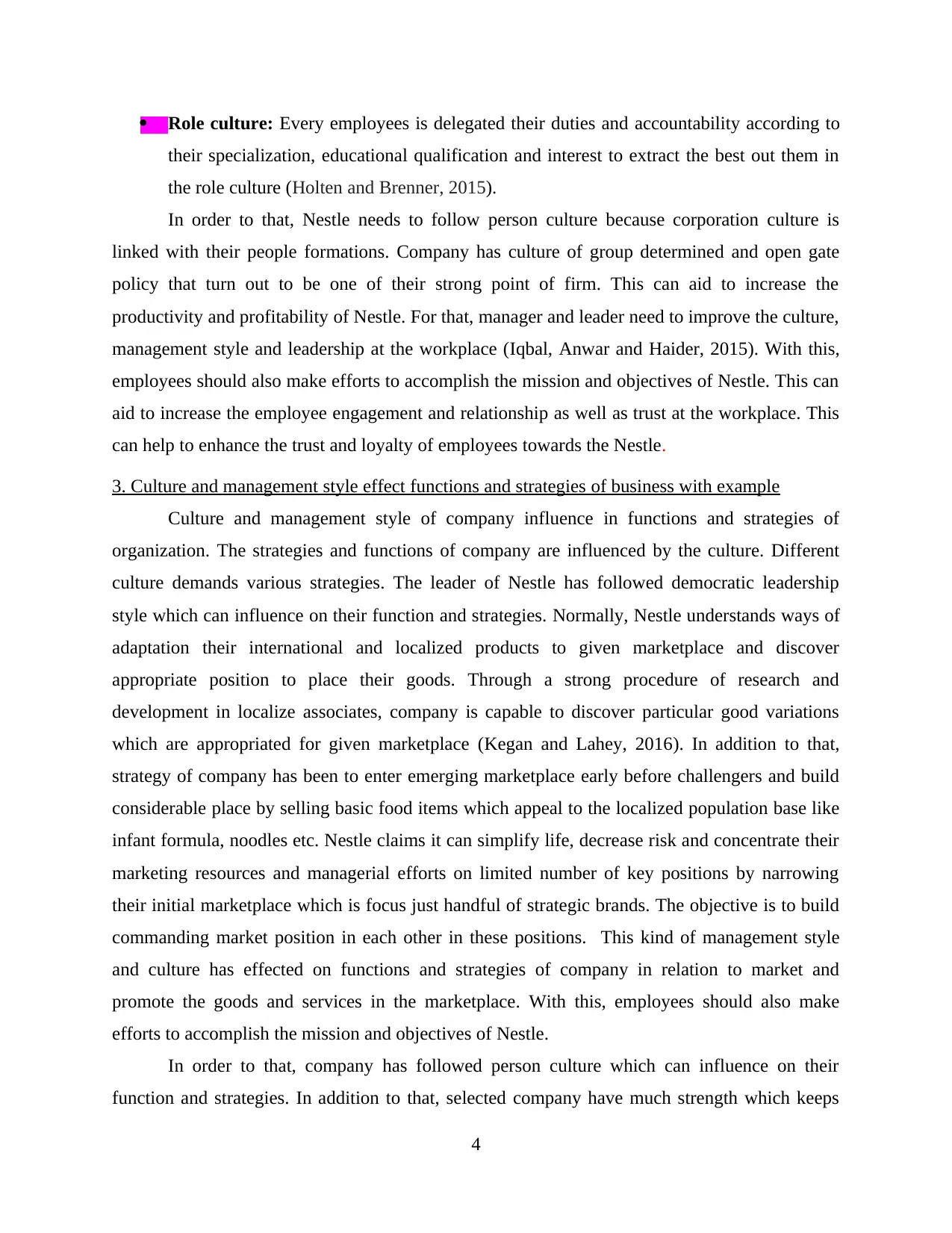
Role culture: Every employees is delegated their duties and accountability according to
their specialization, educational qualification and interest to extract the best out them in
the role culture (Holten and Brenner, 2015).
In order to that, Nestle needs to follow person culture because corporation culture is
linked with their people formations. Company has culture of group determined and open gate
policy that turn out to be one of their strong point of firm. This can aid to increase the
productivity and profitability of Nestle. For that, manager and leader need to improve the culture,
management style and leadership at the workplace (Iqbal, Anwar and Haider, 2015). With this,
employees should also make efforts to accomplish the mission and objectives of Nestle. This can
aid to increase the employee engagement and relationship as well as trust at the workplace. This
can help to enhance the trust and loyalty of employees towards the Nestle.
3. Culture and management style effect functions and strategies of business with example
Culture and management style of company influence in functions and strategies of
organization. The strategies and functions of company are influenced by the culture. Different
culture demands various strategies. The leader of Nestle has followed democratic leadership
style which can influence on their function and strategies. Normally, Nestle understands ways of
adaptation their international and localized products to given marketplace and discover
appropriate position to place their goods. Through a strong procedure of research and
development in localize associates, company is capable to discover particular good variations
which are appropriated for given marketplace (Kegan and Lahey, 2016). In addition to that,
strategy of company has been to enter emerging marketplace early before challengers and build
considerable place by selling basic food items which appeal to the localized population base like
infant formula, noodles etc. Nestle claims it can simplify life, decrease risk and concentrate their
marketing resources and managerial efforts on limited number of key positions by narrowing
their initial marketplace which is focus just handful of strategic brands. The objective is to build
commanding market position in each other in these positions. This kind of management style
and culture has effected on functions and strategies of company in relation to market and
promote the goods and services in the marketplace. With this, employees should also make
efforts to accomplish the mission and objectives of Nestle.
In order to that, company has followed person culture which can influence on their
function and strategies. In addition to that, selected company have much strength which keeps
4
their specialization, educational qualification and interest to extract the best out them in
the role culture (Holten and Brenner, 2015).
In order to that, Nestle needs to follow person culture because corporation culture is
linked with their people formations. Company has culture of group determined and open gate
policy that turn out to be one of their strong point of firm. This can aid to increase the
productivity and profitability of Nestle. For that, manager and leader need to improve the culture,
management style and leadership at the workplace (Iqbal, Anwar and Haider, 2015). With this,
employees should also make efforts to accomplish the mission and objectives of Nestle. This can
aid to increase the employee engagement and relationship as well as trust at the workplace. This
can help to enhance the trust and loyalty of employees towards the Nestle.
3. Culture and management style effect functions and strategies of business with example
Culture and management style of company influence in functions and strategies of
organization. The strategies and functions of company are influenced by the culture. Different
culture demands various strategies. The leader of Nestle has followed democratic leadership
style which can influence on their function and strategies. Normally, Nestle understands ways of
adaptation their international and localized products to given marketplace and discover
appropriate position to place their goods. Through a strong procedure of research and
development in localize associates, company is capable to discover particular good variations
which are appropriated for given marketplace (Kegan and Lahey, 2016). In addition to that,
strategy of company has been to enter emerging marketplace early before challengers and build
considerable place by selling basic food items which appeal to the localized population base like
infant formula, noodles etc. Nestle claims it can simplify life, decrease risk and concentrate their
marketing resources and managerial efforts on limited number of key positions by narrowing
their initial marketplace which is focus just handful of strategic brands. The objective is to build
commanding market position in each other in these positions. This kind of management style
and culture has effected on functions and strategies of company in relation to market and
promote the goods and services in the marketplace. With this, employees should also make
efforts to accomplish the mission and objectives of Nestle.
In order to that, company has followed person culture which can influence on their
function and strategies. In addition to that, selected company have much strength which keeps
4
⊘ This is a preview!⊘
Do you want full access?
Subscribe today to unlock all pages.

Trusted by 1+ million students worldwide
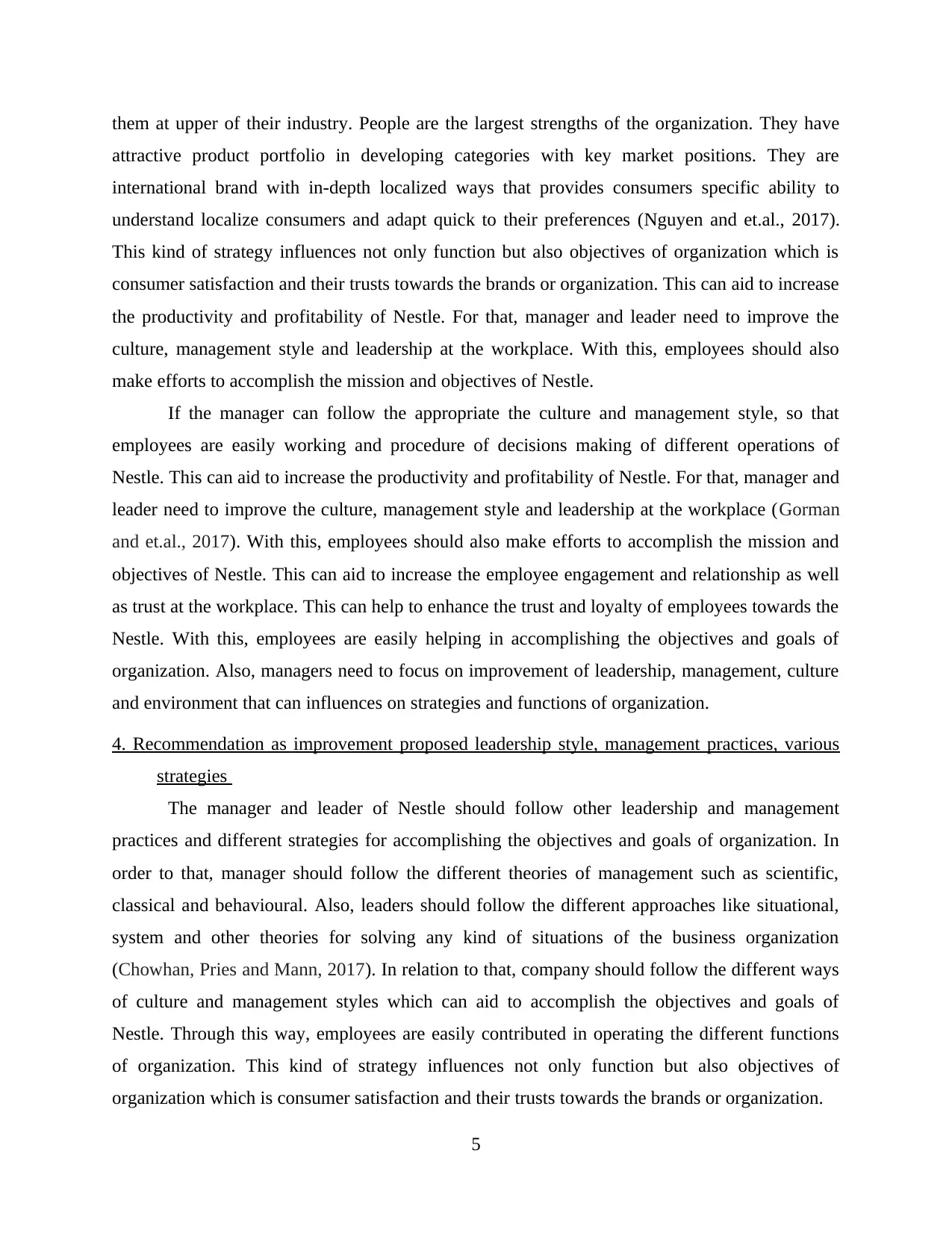
them at upper of their industry. People are the largest strengths of the organization. They have
attractive product portfolio in developing categories with key market positions. They are
international brand with in-depth localized ways that provides consumers specific ability to
understand localize consumers and adapt quick to their preferences (Nguyen and et.al., 2017).
This kind of strategy influences not only function but also objectives of organization which is
consumer satisfaction and their trusts towards the brands or organization. This can aid to increase
the productivity and profitability of Nestle. For that, manager and leader need to improve the
culture, management style and leadership at the workplace. With this, employees should also
make efforts to accomplish the mission and objectives of Nestle.
If the manager can follow the appropriate the culture and management style, so that
employees are easily working and procedure of decisions making of different operations of
Nestle. This can aid to increase the productivity and profitability of Nestle. For that, manager and
leader need to improve the culture, management style and leadership at the workplace (Gorman
and et.al., 2017). With this, employees should also make efforts to accomplish the mission and
objectives of Nestle. This can aid to increase the employee engagement and relationship as well
as trust at the workplace. This can help to enhance the trust and loyalty of employees towards the
Nestle. With this, employees are easily helping in accomplishing the objectives and goals of
organization. Also, managers need to focus on improvement of leadership, management, culture
and environment that can influences on strategies and functions of organization.
4. Recommendation as improvement proposed leadership style, management practices, various
strategies
The manager and leader of Nestle should follow other leadership and management
practices and different strategies for accomplishing the objectives and goals of organization. In
order to that, manager should follow the different theories of management such as scientific,
classical and behavioural. Also, leaders should follow the different approaches like situational,
system and other theories for solving any kind of situations of the business organization
(Chowhan, Pries and Mann, 2017). In relation to that, company should follow the different ways
of culture and management styles which can aid to accomplish the objectives and goals of
Nestle. Through this way, employees are easily contributed in operating the different functions
of organization. This kind of strategy influences not only function but also objectives of
organization which is consumer satisfaction and their trusts towards the brands or organization.
5
attractive product portfolio in developing categories with key market positions. They are
international brand with in-depth localized ways that provides consumers specific ability to
understand localize consumers and adapt quick to their preferences (Nguyen and et.al., 2017).
This kind of strategy influences not only function but also objectives of organization which is
consumer satisfaction and their trusts towards the brands or organization. This can aid to increase
the productivity and profitability of Nestle. For that, manager and leader need to improve the
culture, management style and leadership at the workplace. With this, employees should also
make efforts to accomplish the mission and objectives of Nestle.
If the manager can follow the appropriate the culture and management style, so that
employees are easily working and procedure of decisions making of different operations of
Nestle. This can aid to increase the productivity and profitability of Nestle. For that, manager and
leader need to improve the culture, management style and leadership at the workplace (Gorman
and et.al., 2017). With this, employees should also make efforts to accomplish the mission and
objectives of Nestle. This can aid to increase the employee engagement and relationship as well
as trust at the workplace. This can help to enhance the trust and loyalty of employees towards the
Nestle. With this, employees are easily helping in accomplishing the objectives and goals of
organization. Also, managers need to focus on improvement of leadership, management, culture
and environment that can influences on strategies and functions of organization.
4. Recommendation as improvement proposed leadership style, management practices, various
strategies
The manager and leader of Nestle should follow other leadership and management
practices and different strategies for accomplishing the objectives and goals of organization. In
order to that, manager should follow the different theories of management such as scientific,
classical and behavioural. Also, leaders should follow the different approaches like situational,
system and other theories for solving any kind of situations of the business organization
(Chowhan, Pries and Mann, 2017). In relation to that, company should follow the different ways
of culture and management styles which can aid to accomplish the objectives and goals of
Nestle. Through this way, employees are easily contributed in operating the different functions
of organization. This kind of strategy influences not only function but also objectives of
organization which is consumer satisfaction and their trusts towards the brands or organization.
5
Paraphrase This Document
Need a fresh take? Get an instant paraphrase of this document with our AI Paraphraser
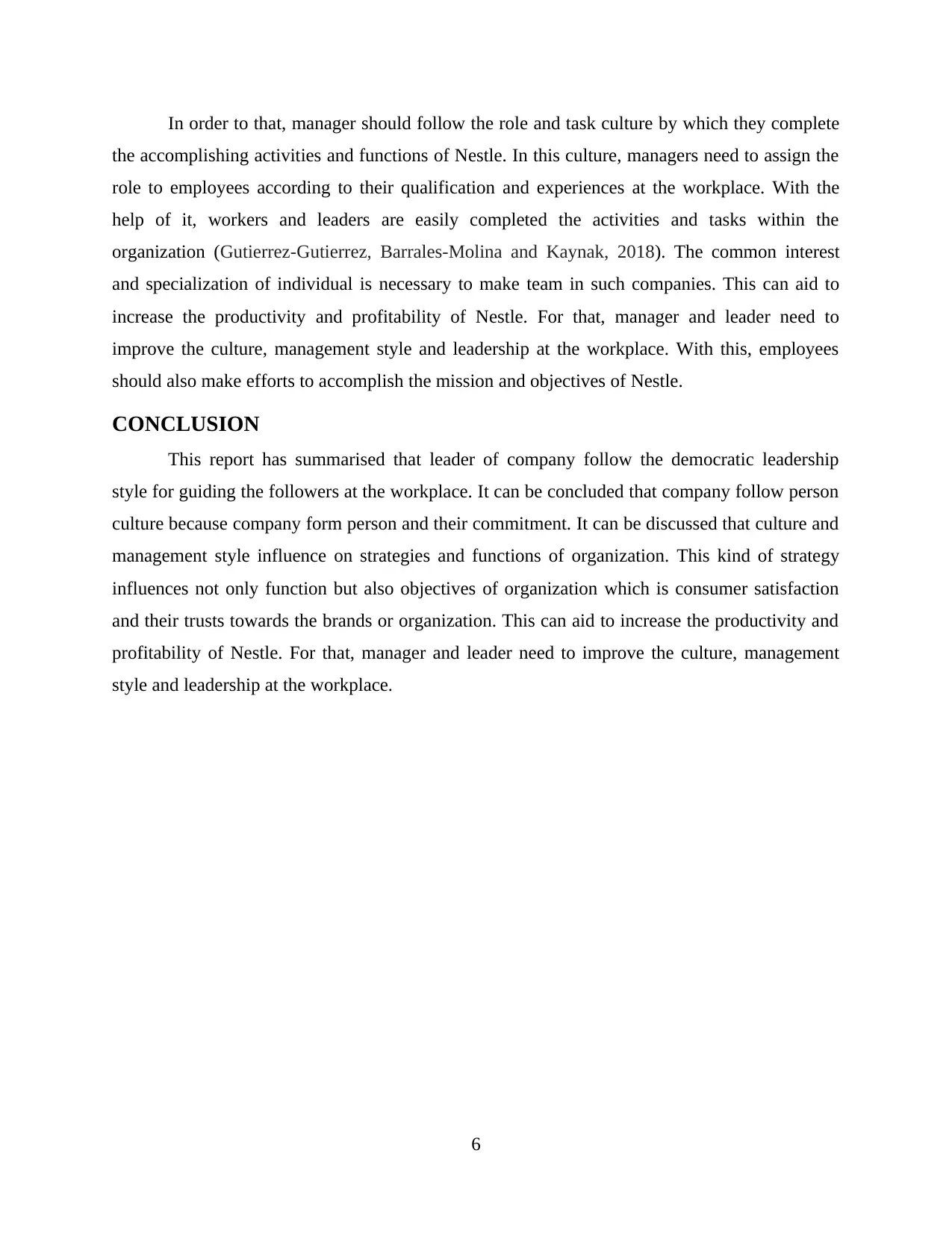
In order to that, manager should follow the role and task culture by which they complete
the accomplishing activities and functions of Nestle. In this culture, managers need to assign the
role to employees according to their qualification and experiences at the workplace. With the
help of it, workers and leaders are easily completed the activities and tasks within the
organization (Gutierrez-Gutierrez, Barrales-Molina and Kaynak, 2018). The common interest
and specialization of individual is necessary to make team in such companies. This can aid to
increase the productivity and profitability of Nestle. For that, manager and leader need to
improve the culture, management style and leadership at the workplace. With this, employees
should also make efforts to accomplish the mission and objectives of Nestle.
CONCLUSION
This report has summarised that leader of company follow the democratic leadership
style for guiding the followers at the workplace. It can be concluded that company follow person
culture because company form person and their commitment. It can be discussed that culture and
management style influence on strategies and functions of organization. This kind of strategy
influences not only function but also objectives of organization which is consumer satisfaction
and their trusts towards the brands or organization. This can aid to increase the productivity and
profitability of Nestle. For that, manager and leader need to improve the culture, management
style and leadership at the workplace.
6
the accomplishing activities and functions of Nestle. In this culture, managers need to assign the
role to employees according to their qualification and experiences at the workplace. With the
help of it, workers and leaders are easily completed the activities and tasks within the
organization (Gutierrez-Gutierrez, Barrales-Molina and Kaynak, 2018). The common interest
and specialization of individual is necessary to make team in such companies. This can aid to
increase the productivity and profitability of Nestle. For that, manager and leader need to
improve the culture, management style and leadership at the workplace. With this, employees
should also make efforts to accomplish the mission and objectives of Nestle.
CONCLUSION
This report has summarised that leader of company follow the democratic leadership
style for guiding the followers at the workplace. It can be concluded that company follow person
culture because company form person and their commitment. It can be discussed that culture and
management style influence on strategies and functions of organization. This kind of strategy
influences not only function but also objectives of organization which is consumer satisfaction
and their trusts towards the brands or organization. This can aid to increase the productivity and
profitability of Nestle. For that, manager and leader need to improve the culture, management
style and leadership at the workplace.
6
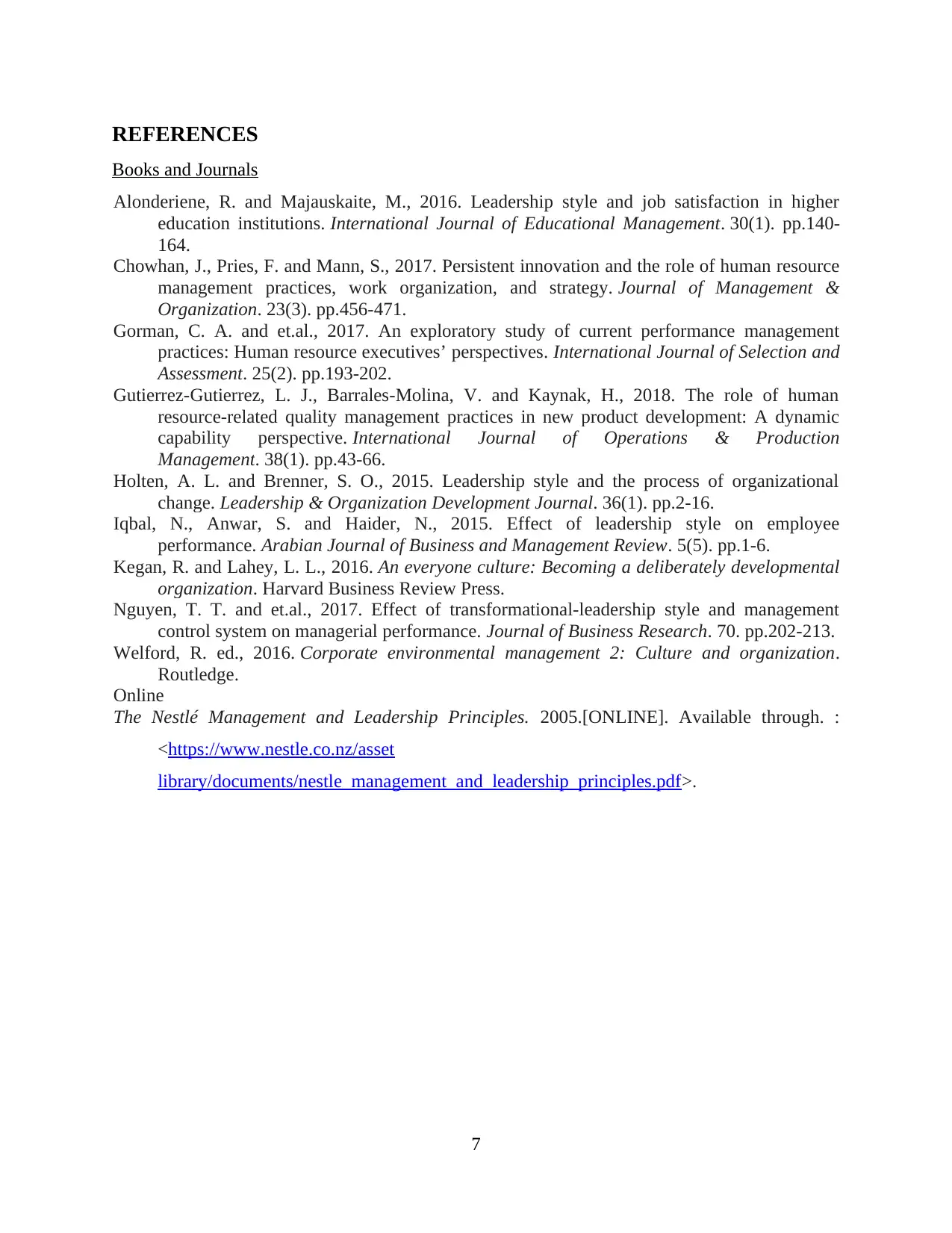
REFERENCES
Books and Journals
Alonderiene, R. and Majauskaite, M., 2016. Leadership style and job satisfaction in higher
education institutions. International Journal of Educational Management. 30(1). pp.140-
164.
Chowhan, J., Pries, F. and Mann, S., 2017. Persistent innovation and the role of human resource
management practices, work organization, and strategy. Journal of Management &
Organization. 23(3). pp.456-471.
Gorman, C. A. and et.al., 2017. An exploratory study of current performance management
practices: Human resource executives’ perspectives. International Journal of Selection and
Assessment. 25(2). pp.193-202.
Gutierrez-Gutierrez, L. J., Barrales-Molina, V. and Kaynak, H., 2018. The role of human
resource-related quality management practices in new product development: A dynamic
capability perspective. International Journal of Operations & Production
Management. 38(1). pp.43-66.
Holten, A. L. and Brenner, S. O., 2015. Leadership style and the process of organizational
change. Leadership & Organization Development Journal. 36(1). pp.2-16.
Iqbal, N., Anwar, S. and Haider, N., 2015. Effect of leadership style on employee
performance. Arabian Journal of Business and Management Review. 5(5). pp.1-6.
Kegan, R. and Lahey, L. L., 2016. An everyone culture: Becoming a deliberately developmental
organization. Harvard Business Review Press.
Nguyen, T. T. and et.al., 2017. Effect of transformational-leadership style and management
control system on managerial performance. Journal of Business Research. 70. pp.202-213.
Welford, R. ed., 2016. Corporate environmental management 2: Culture and organization.
Routledge.
Online
The Nestlé Management and Leadership Principles. 2005.[ONLINE]. Available through. :
<https://www.nestle.co.nz/asset
library/documents/nestle_management_and_leadership_principles.pdf>.
7
Books and Journals
Alonderiene, R. and Majauskaite, M., 2016. Leadership style and job satisfaction in higher
education institutions. International Journal of Educational Management. 30(1). pp.140-
164.
Chowhan, J., Pries, F. and Mann, S., 2017. Persistent innovation and the role of human resource
management practices, work organization, and strategy. Journal of Management &
Organization. 23(3). pp.456-471.
Gorman, C. A. and et.al., 2017. An exploratory study of current performance management
practices: Human resource executives’ perspectives. International Journal of Selection and
Assessment. 25(2). pp.193-202.
Gutierrez-Gutierrez, L. J., Barrales-Molina, V. and Kaynak, H., 2018. The role of human
resource-related quality management practices in new product development: A dynamic
capability perspective. International Journal of Operations & Production
Management. 38(1). pp.43-66.
Holten, A. L. and Brenner, S. O., 2015. Leadership style and the process of organizational
change. Leadership & Organization Development Journal. 36(1). pp.2-16.
Iqbal, N., Anwar, S. and Haider, N., 2015. Effect of leadership style on employee
performance. Arabian Journal of Business and Management Review. 5(5). pp.1-6.
Kegan, R. and Lahey, L. L., 2016. An everyone culture: Becoming a deliberately developmental
organization. Harvard Business Review Press.
Nguyen, T. T. and et.al., 2017. Effect of transformational-leadership style and management
control system on managerial performance. Journal of Business Research. 70. pp.202-213.
Welford, R. ed., 2016. Corporate environmental management 2: Culture and organization.
Routledge.
Online
The Nestlé Management and Leadership Principles. 2005.[ONLINE]. Available through. :
<https://www.nestle.co.nz/asset
library/documents/nestle_management_and_leadership_principles.pdf>.
7
⊘ This is a preview!⊘
Do you want full access?
Subscribe today to unlock all pages.

Trusted by 1+ million students worldwide

8
1 out of 10
Related Documents
Your All-in-One AI-Powered Toolkit for Academic Success.
+13062052269
info@desklib.com
Available 24*7 on WhatsApp / Email
![[object Object]](/_next/static/media/star-bottom.7253800d.svg)
Unlock your academic potential
Copyright © 2020–2026 A2Z Services. All Rights Reserved. Developed and managed by ZUCOL.





